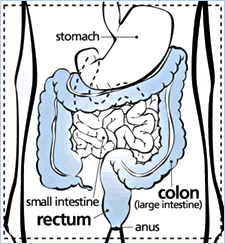Doctor Visits
Get Screened for Colorectal Cancer

The Basics
Overview
If you're between ages 45 and 75 years, get screened (tested) regularly for colorectal cancer. Screening tests can help prevent colorectal cancer or find it early, when it may be easier to treat.
You may need to start getting screened before age 45 years if colorectal cancer runs in your family. Your doctor may also recommend that you continue to get screened if you’re between ages 76 and 85 years, depending on things like your overall health and your preferences.
Talk with your doctor about your risk for colorectal cancer.
How often should I get screened for colorectal cancer?
How often you need to get screened will depend on:
- Your risk for colorectal cancer
- Which screening test you choose
How do I decide which type of screening test to get?
There are different ways to screen for colorectal cancer. Your doctor can help you decide which type of screening test is right for you.
Before you talk with your doctor about which screening to get, it can be helpful to think about your preferences. Answer these questions to find out which screening test you would prefer — then share the results with your doctor.
What to Expect
What are the different kinds of screening tests?
There are several different kinds of screening tests for colorectal cancer. The main types are:
- Stool-based tests
- Tests that look inside the colon and rectum
Stool-based tests are done at home. You collect a stool (poop) sample and send it to your doctor's office or a lab for testing.
Tests that look inside your colon and rectum — like a colonoscopy — happen in a doctor's office or hospital. For these tests, you’ll need to take a laxative to clean out your bowels before the appointment. For a colonoscopy or sigmoidoscopy, your doctor will use a thin, flexible tool with a camera on the end to look inside your rectum and colon. And for a colonoscopy, you'll get anesthesia (medicines that make you relaxed or put you to sleep) before the test, and you'll need someone to drive you home after the test.
In general, if you choose a stool-based test, you’ll need to get tested more often. If you choose tests that look inside your colon and rectum, you’ll need to get tested less often.
Your doctor will tell you how to get ready for your test, including if you need to avoid certain foods or medicines beforehand. Learn more about colorectal cancer screening tests.
Does it hurt to get a colonoscopy?
Preparing for a colonoscopy can be unpleasant, but most people agree that the benefits to their health outweigh any discomfort. And getting anesthesia means you won’t have any pain or feel uncomfortable during the test.
To learn more, check out these colorectal cancer screening stories from real people.
Colorectal Cancer
What is colorectal cancer?
Colorectal cancer is a cancer that develops in the colon or the rectum. The colon is the longest part of the large intestine. The rectum is the bottom part of the large intestine.
Like all cancers, colorectal cancer can spread to other parts of your body. Find out more about colorectal cancer.
Am I at Risk?
Am I at risk for colorectal cancer?
The risk of developing colorectal cancer goes up as you get older. That’s why screening is recommended for everyone ages 45 to 75 years.
Other risk factors are:
- Having certain types of polyps (growths) inside the colon
- Having a personal or family history of colorectal cancer
- Smoking cigarettes or drinking too much alcohol
- Having overweight or obesity
- Not getting enough physical activity
- Having certain inherited conditions, like familial adenomatous polyposis (FAP) or Lynch syndrome
- Having inflammatory bowel disease, like Crohn’s disease or ulcerative colitis, or other health conditions that cause chronic (long-term) problems with the small intestine and large intestine
Read more about risk factors for colorectal cancer. And use this calculator with your doctor to find out your risk of colorectal cancer.
Take control — get screened regularly.
If you get screened regularly, you have a good chance of preventing colorectal cancer or finding it when it can be treated more easily.
During a colonoscopy:
- If your doctor finds polyps inside your colon, they can remove the polyps during your test — before they turn into cancer
- If your doctor finds cancer during the test, you can take steps to get treatment right away
If you get an unusual result on a stool test, your doctor will do a follow-up colonoscopy to look for cancer.
Take Action
Get Screened
The best way to prevent colorectal cancer — or find it early — is to get screened starting at age 45 years.
Talk with your doctor about getting screened.
Use these questions to ask your doctor about colorectal cancer screening. Take them to your next checkup — you can print them out or pull them up on a smartphone or tablet.
What about cost?
Under the Affordable Care Act, health insurance plans must cover screening for colorectal cancer. Depending on your plan, you may be able to get screened at no cost to you. Check with your insurance company to find out more.
Medicare may also cover colorectal cancer screening at no cost. If you have Medicare, find out about Medicare coverage for different colorectal cancer screening tests.
If you don’t have insurance, you may still be able to get free or low-cost colorectal cancer screening. Find a health center near you and ask about colorectal cancer screening.
To learn more, check out these resources:
- Free preventive care covered by the Affordable Care Act
- How the Affordable Care Act protects you
- Understanding your health insurance and how to use it [PDF - 698 KB]
Get support.
If you're nervous about getting a colorectal cancer screening, you can:
- Ask a family member or friend to go with you when you talk to the doctor
- Talk with people you know who have been screened to learn what to expect
Give support.
Do you know someone age 45 years or older who hasn’t been screened for colorectal cancer yet? Use these tips to start a conversation about the importance of screening.
Healthy Habits
Quit smoking.
People who smoke are more likely to get colorectal cancer. If you smoke, make a plan to quit today.
Aim for a healthy weight.
Having overweight raises your chance of developing colon cancer. Get tips to manage your weight.
Get active.
Regular exercise helps lower your risk of colorectal cancer. Take steps to get moving today.
Drink alcohol only in moderation.
Drinking too much alcohol raises your risk of colorectal cancer. If you choose to drink, have only a moderate (limited) amount. This means:
- 1 drink or less in a day for women
- 2 drinks or less in a day for men
Eat healthy foods.
What you eat may affect your risk for colorectal cancer.
Eating these foods may help lower your risk:
- Fruits
- Vegetables
- Other foods high in fiber (like whole grains, nuts, and seeds)
Eating processed meat (like deli meats, sausage, or bacon) or red meat may raise your risk.
Content last updated August 16, 2024
Reviewer Information
This information on colorectal cancer was adapted from materials from the Centers for Disease Control and Prevention and the National Cancer Institute.
Reviewed by:
Rebecca Chasan, PhD
Chief, Science Writing and Review Branch
National Cancer Institute
National Institutes of Health
Ann Pluta, PhD
Scientific Communications Editor Office of Communications and Public Liaison
National Cancer Institute
National Institutes of Health



